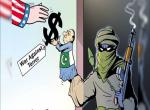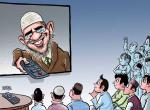Instead of an episodic response, we need stronger laws and proactive intelligence backed by political will
Having decided that India is their prime target, Pakistan and its out¬sourced networks in and around India only have to choose the site which will provide the biggest impact from a terrorist strike. Hyderabad was ideal because there has been a discernable lack of political will in Andhra Pradesh to tackle terrorism effectively, something which had also percolated down to the police force. An anti-terror law like POTA and strong political will are the two most important instruments of a state's war against terrorism. The lack of these will give the terrorist the confidence that he can strike at will. The blasts were the fail¬ure of an entire system brought about by a lack of political will and security policies hamstrung by opportunism, bureaucratic stereotypes substituting hard-headed responses and smart articulation marketed as capa¬city build-up.
UPA'S CMP speaks of with¬drawal of POTA, action against those who spread communal ha¬tred and halting encounters by the police force. But astonish¬ingly, the manifesto is silent on cross-border terrorism. The manifesto speaks about protect¬ing the minorities, but what about protecting both the major¬ity and the minority from terror attacks? Terrorism directly threatens our sovereignty and integrity but we are merely treating it as a law and order problem. India has lost the most number of people to ter¬rorism after Iraq, which is a war zone, yet a democracy like ours has the weakest laws to fight terror. This is despite us being signatories to several UN resolutions where we have resolved to strengthen internal laws to fight terror. The US has its Patriot Act, the UK has new terror laws and even Pakistan has far harsher anti-terror laws which make hi¬jacking punishable by death.
We urgently need to implement judicial reforms which have been suggested by the Justice Malimath Committee on criminal justice reforms and new legislations to tackle
SAURABH SINGH
Terrorism. Blaming intelligence agencies is not the answer because a mere episodic response to terror will cost the country dear. What we need is capacity build-up, which meets the threat adequately. It includes constant upgrada¬tion of tactics, training and technology and laws to out¬smart the terrorists before they surprise you. This is not possible in the absence of political will.
In the past two years there have been at least two dozen publicly available inputs to suggest that the city is on the terrorists' radar. In the past seven months alone there have been over a dozen arrests, which point to the city as a target, from the arrest of terrorists in Gujarat with fake currency meant for Hyderabad to the recovery of explo¬sives destined for the city. These should have alerted the state police force to ask questions and conduct operations to sanitise the city. If the country expects intelligence agencies to forecast the exact location or the time of an attack, that isn't going to hap¬pen because at times even the bombers don't know where the explosives are to be planted until a few hours before the attack. Refinement of intelligence and an aggressive follow-up of leads are the need of the hour.
The deterrence threshold for groups, societies and individuals pursuing this policy of terror has to be raised substantially to make it costly for them to con¬tinue operating. We need a rad¬ical shift in our policy from a purely defensive one at present to a defensive-offensive one. This calls for proac¬tive policing and intelligence doctrines to act fast and smart. Just as taking out one of the components of an ex¬plosive will defuse the bomb, taking out the many compo¬nents that make a terrorist plan succeed—overground sympathisers, hawala money, explosives, shelter—will thwart an attack. This can happen only by constantly car¬rying out operations, thinking out of the box and putting terrorists on the run. The risks of failing in this war are far too enormous.
The author is a former chief of the Intelligence Bureau
PPublished in India Today on 10 Sept. 2007









Post new comment